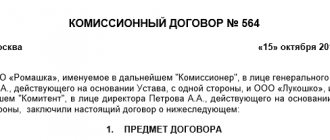Relying on the Law
An agreement according to which the customer (employer) gives the contractor (employee) a certain task with subsequent payment for the result is a contract .
The provisions that regulate this type of relationship are enshrined not in the Labor Code, but in the Civil Code (Chapter 37-38 of the Civil Code of the Russian Federation). In addition, specialized legal acts are applicable to certain types of contracts, such as consumer protection, federal laws relating to architectural, investment activities, etc.
Contract with character
Features and differences between a work contract and other types of approval documents:
- Consensuality . A contract is concluded from the moment the parties agreed on the terms and sealed the promise to fulfill them with signatures. No further actions are required to initiate the contract.
- Reciprocity . Both parties are legally equal. The basis of contracts of this type is initial mutual trust and good conscience.
- Remuneration . Both parties, having fulfilled the agreement, receive a certain profit.
- Divisibility of an object . If the result obtained can be divided into several equal independent parts, the subject of the contract is considered divisible. An indivisible object implies the singularity of the result of the contractor’s actions.
Contracts can be different, most often the following are concluded:
- building;
- domestic;
- design;
- municipal or state;
- for scientific research.
A work contract is in many ways similar to other obligations, which provide for the performance of certain actions, but it has many unique features that make such a document a separate form of agreement.
| № | Type of agreement | Similarities with a contract | Difference | |
| Another agreement | Work agreement | |||
| 1 | Contract of sale | Under the contract, a thing (material object) is transferred | You can transfer not only objects, but also rights, real estate, property complexes, as well as energy | Only things (created or transformed) can be transferred |
| Only the transfer of the subject of the contract is regulated | The process of manufacturing or transforming a thing is regulated | |||
| Subjects of the contract - Things that have generic characteristics | The subjects of the contract are individually determined | |||
| 2 | Service agreement | The contractor performs certain actions as requested by the customer | The activity may not have a tangible result (training, treatment, etc.) | Only the material result of activity |
| 3 | Employment contract | You can conclude one instead of the other, only with different legal consequences | Internal labor regulations of the team | The organization of the contractor's work does not matter |
| Guaranteed salary regardless of work results | Payment upon delivery of results | |||
| Standardized working day | Final deadlines matter | |||
| Employer's material base | The means of production belong to the contractor | |||
| Social benefits (vacation, sick leave, pension) | None | |||
| What the employee creates belongs to the employer | Before transfer, the owner of the thing is the contractor | |||
work contract (contract)
- Contract agreement (general form) (format *txt size 16 Kb)
- Contract for the performance of work on the production of products (format *txt size 7 Kb)
- Education agreement for training in additional educational programs (approved by Order of the Ministry of Education and Science of the Russian Federation dated October 25, 2013 No. 1185) (Word 2007 format ~ 25 Kb)
- Agreement for the provision of paid educational services in the field of vocational education (approved by Order of the Ministry of Education of Russia dated July 28, 2003 N 3177) (RTF format ~ 165 Kb).
- Agreement on the provision of paid educational services by state and municipal educational institutions (approved by Order of the Ministry of Education of Russia dated July 10, 2003 N 2994) (RTF format ~ 166 Kb).
- Agreement on the provision of paid educational services by non-state educational organizations (approved by Order of the Ministry of Education of Russia dated July 10, 2003 N 2994) (RTF format ~ 179 KB).
- Agreement on the provision of paid educational services by an individual entrepreneur (approved by Order of the Ministry of Education of Russia dated July 10, 2003 N 2994) (RTF format ~ 137 KB).
Information posted on April 15, 2012. Added - 12/22/2012, 10/21/2018
ATTENTION!
Copying the article without providing a direct link is prohibited. Changes to the article are possible only with the permission of the author.
Author: lawyer and tax consultant Alexander Shmelev © 2001 — 2020
View from different sides
There are 2 parties to the contract: the customer and the contractor . They can be both individuals and legal entities, as well as individual entrepreneurs (in any combination of each other).
The law does not prohibit the involvement of additional performers - subcontractors . Then the first contractor will act as a general contractor, responsible to the customer, while the subcontractors are already responsible to him. If the subject of the contract is divisible, each subcontractor is responsible for its share. In case of indivisibility, the liability of subcontractors is joint and several.
REFERENCE! The relationship between the general contractor and subcontractors is regulated by a separate document - a subcontract agreement.
Without which there will be no contract
In a work contract, the essential elements include the subject of the contract and the deadlines for completion. Another element that does not affect materiality is the price, sometimes drawn up as an estimate. Let's take a closer look at these elements.
What subject are we talking about?
A work contract implies a specific subject - the result for which the contract was concluded. The achieved result must be material, separable from both sides. In addition, it must be possible to guarantee the quality of the result; it must depend on objective factors.
FOR EXAMPLE: the quality of the built foundation for a house depends on the materials used, it must comply with certain SNiPs, GOSTs and have a warranty period (that is, the foundation must last a certain period). But an English language course, even if taught by the best teachers using certified manuals, will not necessarily be mastered by students. Therefore, the latter cannot be the subject of a contract, unlike the former.
So, the subject of a contract can only be a thing or a property of this thing:
- a newly created material object (for example, a manufactured table);
- a new property of an already finished item (for example, an improved or repaired device);
- another result that has materiality (for example, developed documentation).
Enter deadlines
The deadlines specified in the text are essential - without them, the contract will not be valid. It is necessary to mark the start and end dates of the work. It is permissible to establish intermediate stages, especially in long-term contracts. Meeting the allotted time is the contractor’s problem. But, if stipulated by the conditions, the dates can be moved at the initiative of both parties.
Completion of the contract sooner than specified is at the discretion of the contractor. If the contract has a clause on urgency, delays will be paid additionally.
IMPORTANT! When the customer sees that the contractor will definitely not meet the deadline due to a late start or insufficient pace of work, it is permissible to refuse the contract and demand compensation for damages.
The other side also has the right to be paid for the results of work on time. If the customer delays accepting the work, avoiding contacts with the contractor, then the latter has the right, after informing the customer twice, to sell the result of his work a month after the deadline, taking the due amount for himself and sending the rest of the amount to the customer’s account.
Everything has a price
For construction contracts, cost is not a mandatory condition. Instead of putting down numbers, you can indicate how the remuneration is set: usually it is labor costs plus payment for the work. The price may not be indicated: in this case, the calculation takes place at similar prices for similar work.
FOR YOUR INFORMATION! The price is not necessarily fixed in monetary terms: by agreement, the contractor may be provided with a certain service or certain property may be transferred.
If the contract is large-scale, long-term and involves different types of work, it is more logical to document the cost with an estimate. Any party can create it. If the parties have not decided on the approximate estimate, it is taken into account as firm by default - that is, it is unacceptable to deviate from its provisions in the direction of exceeding it.
NOTE! A contractor who exceeds the firm estimate may be refused further cooperation (with compensation for the part of the work performed). But if the overexpenditure is associated with objective reasons, for example, an increase in the cost of consumables, the contractor has the same rights (Article 451 of the Civil Code of the Russian Federation).
What is a contract?
Based on the meaning of Article 15 of the Labor Code, labor relations are recognized as the interaction of two persons under the following conditions:
- one person (employer) has a permanent job in a specific position or profession;
- the second person (employee) agrees to perform the work;
- A certain amount of money is regularly paid for work.
If a company needs temporary services, for example, something needs to be built, repaired, adjusted, but there is no suitable contractor on staff, then you can hire a contractor.
A contract within the meaning of Article 702 of the Civil Code is an obligation to perform certain work for a certain fee.
For example, there is no boring lathe operator on staff, but a company producing metal structures needed to boring several parts. There is no need to overload the staff with extra personnel if parts will have to be bored very rarely, and maybe not at all. There is also no need to conclude a fixed-term employment contract, this is unnecessary bureaucracy.
There is only one way out: invite a lathe-borer to work as a contractor.
In fact, a contract can replace a fixed-term employment contract and at the same time:
- no need to register new employees (and therefore no need to change the staffing table);
- the company can save on taxes and contributions from contract payments;
- the company will eventually get what it needs, and the contractor will make money.
I have rights, but I also have obligations
The contractor is obliged:
- comply with contractual deadlines and budgets;
- use your own forces, means and materials for work, unless otherwise specified in the contract, while guaranteeing the proper quality of tools, equipment and materials;
- perform the work efficiently (if the standards and warranty periods are not specified in the contract, then the usual requirements for this category of items apply);
- inform the customer about all circumstances that could affect the result (changes in the quality of materials, deadlines, estimates), suspending work until the customer clarifies the situation.
What can a contractor expect:
- customer refusal and compensation;
- if the quality is lower than required - refusal, requirement to replace the subject of the contract, correction of defects, price reduction, reimbursement of correction costs;
- if the contractor did not promptly inform the customer about the changed circumstances and continued performance without approval, then reference to these circumstances will not be taken into account.
The customer is obliged:
- in the case where the contract provides for a change in the quality of the thing, the subject of the contract must be provided in a timely manner and in proper condition;
- if the provision lies with the customer, then everything necessary must also be provided on time;
- respond to contractor requests in a timely manner;
- timely accept work according to the delivery and acceptance procedure;
- make a payment.
What does the customer risk:
- compensation to the contractor in case of unilateral refusal to work;
- suspension of work without timely provision (if agreed upon);
- rescheduling or increasing the cost of work (if there are problems with facilitating the work);
- without checking the quality during transmission, appeal to obvious shortcomings of the work.
Price and payment procedure
2020 agreements may or may not specify a price for the work. If the price for performing work is not indicated in the contract form, it is determined in accordance with clause 3 of Art. 424 Civil Code of the Russian Federation.
The contract price consists of compensation for the contractor’s expenses and his remuneration. In addition, the price can be determined by drawing up an estimate, which, after its approval by the customer, becomes an integral part of the form of the concluded contract. Thus, the sample contract agreement may not contain information about the price. But only if it is indicated in the estimate.
If there is a need for additional work, and this causes a significant increase in price, the contractor is obliged to inform the customer about this. The customer has the right to terminate the contract if the new price does not suit him. In this case, the Contractor has the right to demand from the customer payment for work already completed, if any.
If the contract does not stipulate advance payment for the work or payment for its individual stages, the customer is obliged to make full payment after receiving the results. The contractor has the right to demand payment of an advance only if this contract was concluded on such a condition.
We accept the finished result
The paper that records the completion of the work by the contractor and the satisfaction of the customer with it is called the act of acceptance of the work performed. It is mandatory only for construction contracts (clause 4, Article 753 of the Civil Code), but is also used in other agreements. This document can serve as evidence in case of legal disputes. The specifics of the contents of the act are recorded in the contract and appendices:
- form of the agreement (not defined by law);
- procedure for signing by the parties;
- timing of signing;
- persons authorized to sign;
- liability of the parties for non-signing.
Download the contract
If you have not found the answer to your question or there are still misunderstandings, contact a lawyer for a free consultation in the chat on our website
| Standard contract for contract work |
| Contract agreement with an individual |
| Contract for capital construction |
| Contract agreement for the performance of VTK works |
| Contract agreement for major repairs |
| Contract agreement for apartment renovation |
| Contract for interior finishing of a building |
| Contract for design and survey work |
Manual for drawing up a work acceptance certificate
Clause 1 of Article 720 of the Civil Code states that inspection of the work result and its acceptance must be carried out by the customer in the presence of the contractor, and at the same time they sign the corresponding act. In order for the procedure to go smoothly, you need to pay attention to the proper preparation of the document. We provide step-by-step instructions.
- Name . The document is called “Work Acceptance Certificate”, then you need to indicate which ones, and also provide the details of the relevant contract.
- Date of preparation . It may differ from the final date for completion of work specified in the contract. It is better to agree on the date of acceptance and transfer in the text of the contract separately.
- Details of the parties . Names and details of legal entities, full names of individuals.
- Job information . Information about the type, volume and timing of the contract.
- Calculations . Indication of the amount of monetary or other measure of payment to the contractor.
- Signatures . Persons who completed the act of acceptance and transfer of work or authorized to do so by the customer and contractor, indicating their positions, surnames and initials.
- Seal . It is not provided for by law, but is a business custom; moreover, it contains the customer’s details.
IMPORTANT! If the act does not contain at least one of the listed points, it may be declared invalid.
Construction contract
CONSTRUCTION CONTRACT No.
g.
"" g.
in the person acting on the basis, hereinafter referred to as the “
Contractor
”, on the one hand, and in the person acting on the basis, hereinafter referred to as the “
Customer
”, on the other hand, hereinafter referred to as the “
Parties
”, have concluded this agreement, hereinafter "Agreement" as follows:
SUBJECT OF THE AGREEMENT
1.1. According to this agreement, the Contractor undertakes to build, hereinafter referred to as the “Facility”, in accordance with the Technical Specifications (Appendix No.) and the Estimate (Appendix No.), and the Customer undertakes to create for the Contractor the conditions necessary to carry out the work, accept their result and pay the agreed price.
1.2. The terms of reference consist of the following technical documentation: .
1.3. Payment for work performed is made in the amount provided for in the Estimate, in the following order and within the following terms: .
1.4. The risk of accidental death or accidental damage to the construction project before its acceptance by the Customer is borne by the Contractor.
1.5. Duration of the contract: Start of work: "" year. Completion of work: "" year.
RIGHTS AND OBLIGATIONS OF THE PARTIES
2.1. The Contractor undertakes:
- insure the risks of accidental loss or accidental damage to an object, materials, equipment and other property;
- carry out construction and related work in accordance with the Technical Specifications and Estimates;
- inform the Customer about the need to carry out additional work and increase the estimated cost of construction;
- suspend the relevant work with attribution of losses caused by downtime to the Customer’s account if the Customer does not receive a response to his message about additional work and an increase in the estimated cost within ten days;
- provide construction materials, including parts, structures, or equipment;
- carry out the instructions of the Customer received during construction, if such instructions do not contradict the terms of this agreement and do not constitute interference in the operational and economic activities of the Contractor;
- comply with the requirements of the law and other legal acts on environmental protection and the safety of construction work.
2.2. The Contractor has the right:
- demand, in accordance with Article 450 of the Civil Code, a revision of the Estimate if, for reasons beyond his control, the cost of the work exceeded the Estimate by at least %;
- demand compensation for reasonable expenses incurred in connection with the identification and elimination of defects in the technical documentation.
2.3. The customer undertakes:
- provide a land plot for construction in a timely manner (the area and condition of the land plot provided must ensure the timely start of work, its normal conduct and completion on time);
- transfer to the Contractor for use the buildings and structures necessary for the implementation of the work, ensure the transportation of goods to his address, temporary installation of power supply networks, water and steam pipelines and provide other services: ;
- Payment for the services provided by the Customer, specified in the previous subparagraph of this paragraph, is carried out on the following conditions: ;
- If, during the implementation of control and supervision of the work, deviations from the terms of this contract are discovered that may worsen the quality of the work, or other shortcomings, immediately notify the Contractor of this (the Customer who has not made such a statement loses the right to subsequently refer to the shortcomings discovered by him) .
2.4. The customer has the right:
- make changes to the technical documentation, provided that the additional work caused by this does not exceed ten percent of the total cost of construction indicated in the Estimate and does not change the nature of the work provided for in this contract;
- exercise control and supervision over the progress and quality of work performed, compliance with deadlines for their completion (schedule), and the quality of materials provided by the Contractor, without interfering with the operational and economic activities of the Contractor.
SUBMISSION AND ACCEPTANCE OF WORK
3.1. The Customer, having received the Contractor's message about readiness for delivery of the results of the work performed under this contract, is obliged to immediately begin accepting them.
3.2. The customer organizes and accepts the result of the work at his own expense.
3.3. The delivery of the results of the work by the Contractor and their acceptance by the Customer are formalized by an act signed by both Parties. If one of the Parties refuses to sign the act, a note to this effect is made in it, and the act is signed by the other Party.
3.4. The Customer has the right to refuse to accept the result of work if deficiencies are discovered that exclude the possibility of its use for the purpose specified in this contract and cannot be eliminated by the Contractor or Customer.
FINAL PROVISIONS
4.1. If during construction and the performance of related work obstacles to the proper execution of this agreement are discovered, each of the Parties is obliged to take all reasonable measures within its power to eliminate such obstacles. The party that fails to fulfill this obligation loses the right to compensation for losses caused by the fact that the relevant obstacles were not eliminated.
4.2. The Contractor guarantees that the construction project will achieve the indicators specified in the technical documentation and the ability to operate the facility during the following warranty period: .
4.3. In everything else not regulated in this agreement, the Parties will be guided by the norms of the current civil legislation of Russia.
4.4. The agreement is drawn up in copies.
LEGAL ADDRESSES AND BANK DETAILS OF THE PARTIES
Contractor
- Legal address:
- Mailing address:
- Phone fax:
- INN/KPP:
- Checking account:
- Bank:
- Correspondent account:
- BIC:
- Signature:
Customer
- Legal address:
- Mailing address:
- Phone fax:
- INN/KPP:
- Checking account:
- Bank:
- Correspondent account:
- BIC:
- Signature:
What if the job doesn’t suit you?
If deficiencies are identified during the acceptance of work, the customer can include them in the act (clause 2 of Article 720 of the Civil Code). If this is technically difficult (for example, such a section or column is not provided), the act should not be signed. The reasons for refusing to sign - discovery of deficiencies - must be stated in a separate document, which is sent or handed to the contractor.
If the defects are hidden and only revealed during the operation of the delivered subject of the contract, the customer has the right to declare them within the period established by law.
A signed acceptance certificate deprives the customer of the opportunity to declare obvious deficiencies.









